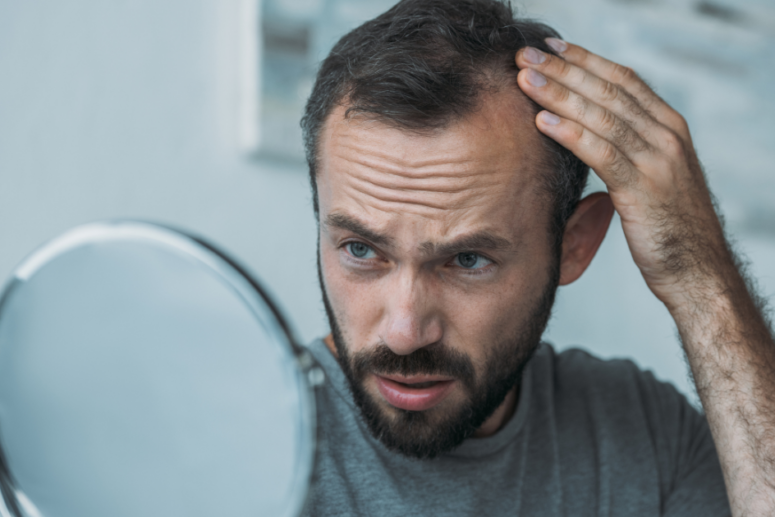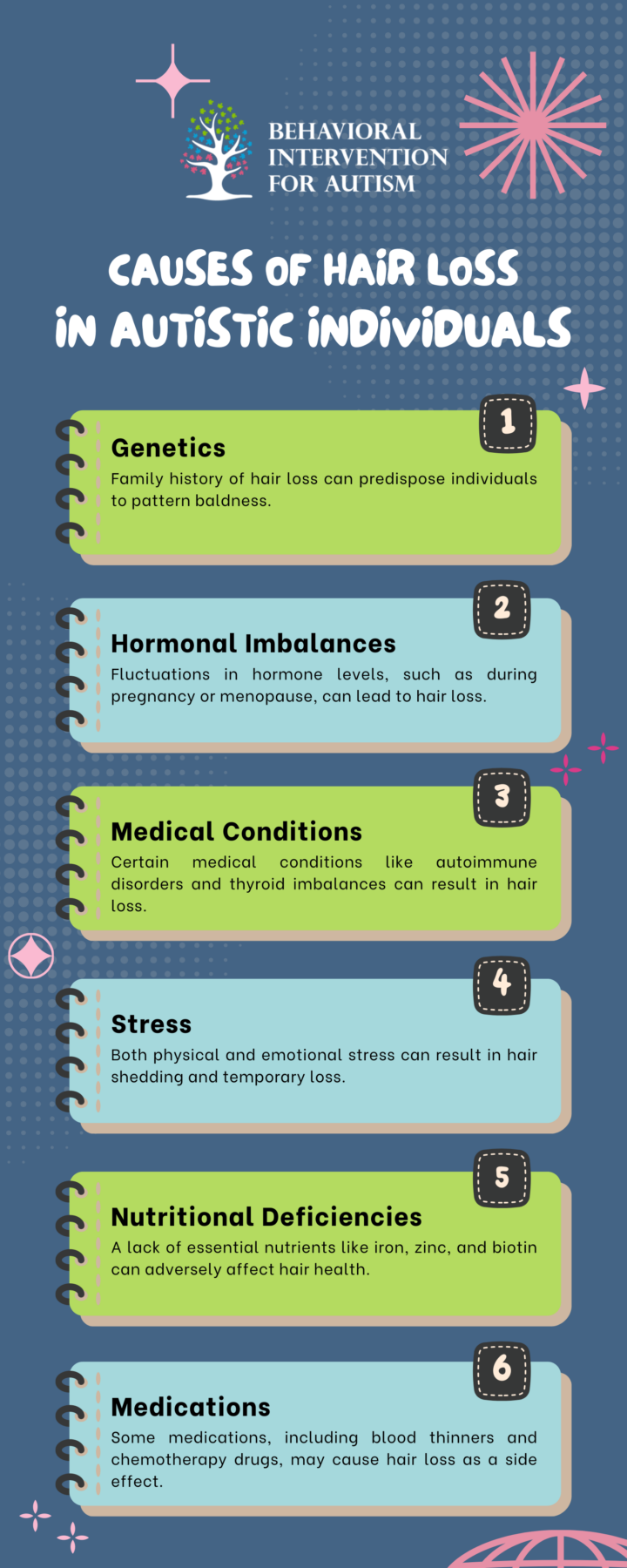
Table of Contents
Exploring the connection between autism and hair loss, it’s essential to have a comprehensive understanding of the factors that contribute to hair loss. The following overview will explore hair loss and its various causes.
Can Autism Cause Hair Loss?
Yes, autism can lead to hair loss, although it’s not a direct symptom of the condition itself. Many individuals with autism experience sensory sensitivities and anxiety, which can contribute to behaviors such as hair pulling or repetitive actions that may lead to hair loss. Conditions associated with autism, like obsessive-compulsive disorder (OCD), can also manifest in habits that result in hair thinning or loss.
However, it’s essential to note that not everyone with autism will experience hair loss. Various factors, including genetics, stress, and other underlying health conditions, can influence hair health. If you or someone you know is facing hair loss related to autism, consulting a healthcare professional can help identify the causes and explore potential solutions.
Hair Loss Overview
Hair loss, or alopecia, is a common ailment that can affect individuals at any age. It is marked by a gradual reduction or total absence of hair on the scalp or other areas of the body. Hair loss can have a significant impact on one’s self-esteem and quality of life, making it a topic of concern for many individuals, including those within the autism community.
Causes of Hair Loss in Autistic Individuals
There are numerous factors that can contribute to hair loss, ranging from genetic predisposition to environmental triggers. Understanding the underlying causes of hair loss is crucial in determining the most appropriate treatment and management strategies. Some common causes of hair loss include:

Autism Spectrum Disorders
Research suggests a potential link between Autism Spectrum Disorders (ASD) and hair loss, particularly alopecia areata, a condition characterized by patchy hair loss. A nationwide population-based study in Korea revealed an increased risk of alopecia areata in individuals diagnosed with ASD.
Link to Hair Loss
The identification of a higher prevalence of alopecia areata in individuals with autism spectrum disorders underscores the intricate relationship between these conditions. While the exact mechanisms behind this phenomenon require further exploration, the observed correlation implies a potential interplay between the underlying factors contributing to both ASD and alopecia areata.
Alopecia Areata Study
In the Korean nationwide population-based study, researchers delved into the prevalence of alopecia areata among individuals with autism spectrum disorders. The findings highlighted a notable increase in the risk of alopecia areata in those diagnosed with ASD, indicating a noteworthy association between these two conditions.
This study serves as a stepping stone in unraveling the complexities of hair loss within the context of autism spectrum disorders, urging for continued research to elucidate the underlying mechanisms and potential therapeutic interventions that may benefit individuals affected by both ASD and alopecia areata.
Elemental Deficiencies in Autism
Exploring the correlation between autism spectrum disorder (ASD) and hair health reveals the importance of identifying potential elemental deficiencies in individuals with ASD. These deficiencies can significantly impact overall health and may lead to various hair-related issues.
Common Deficiencies
Research indicates that some of the most common elemental deficiencies observed in children with autism spectrum disorder include iron, magnesium, zinc, and selenium. These deficiencies can arise due to various factors, including dietary habits, metabolic differences, and gastrointestinal issues commonly associated with ASD.
Element | Common Deficiency in ASD |
Iron | Low levels |
Magnesium | Insufficient intake |
Zinc | Deficiency |
Selenium | Reduced levels |
Identifying and addressing these elemental deficiencies through appropriate dietary modifications or supplementation may help improve the overall health and well-being of individuals with ASD, potentially positively impacting hair health as a consequential benefit.

Impact on Hair Health
The impact of elemental deficiencies on hair health in individuals with autism spectrum disorder can be multifaceted. Hair, being a non-essential tissue, tends to reflect the overall nutritional status of an individual. Insufficient levels of essential elements like iron, magnesium, zinc, and selenium can lead to various hair issues, including dryness, brittleness, and in some cases, hair loss.
Moreover, zinc deficiencies, in particular, have been linked to hair thinning and shedding. Zinc plays a crucial role in hair growth and repair, and its deficiency can disrupt the normal hair growth cycle, leading to issues such as alopecia.
Addressing and managing elemental deficiencies with appropriate interventions can enhance the nutritional status and hair health of individuals with autism spectrum disorder. Regular monitoring and consultation with healthcare professionals are crucial for ensuring a holistic approach to these deficiencies and their impact on overall health, including hair health.
Factors to Consider
Exploring the potential link between autism spectrum disorders and hair loss involves various factors that may impact hair health in affected individuals. Two critical considerations are plasma levels and oxidant-antioxidant status.
Plasma Levels Impact
Plasma levels play a significant role in understanding the potential relationship between autism and hair loss. In autistic children, monitoring plasma phthalate and bisphenol A levels is crucial, as these substances can have adverse effects on overall health, including hair health. Elevated levels of phthalates and bisphenol A have been associated with disruptions in hormonal balance and cellular function, which can manifest in various health conditions, including hair issues.
It is essential for parents and caregivers of individuals with autism to work closely with healthcare providers to monitor and regulate plasma levels through appropriate interventions and lifestyle modifications. By addressing and managing these levels, it may be possible to mitigate potential negative effects on hair health and overall well-being.

Oxidant-Antioxidant Status Effects
Oxidative stress is a key aspect to consider when examining the relationship between autism and hair loss. In autism spectrum disorders, oxidative stress is often heightened, leading to increased lipid peroxidation and a decrease in serum levels of ceruloplasmin and transferrin, which are vital antioxidant proteins. This imbalance between oxidants and antioxidants can contribute to cellular damage and impact various systems in the body, potentially affecting hair health.
Maintaining a balance in oxidant-antioxidant status is crucial for individuals with autism to support overall health, including the health of their hair. Strategies to enhance antioxidant defenses through dietary interventions, supplementation, and lifestyle modifications may help in mitigating the effects of oxidative stress and promoting healthier hair growth and maintenance.
Hair loss can be a concern for individuals with autism, and understanding its potential causes is essential for effective management. Factors such as stress, sensory sensitivities, and certain medications can contribute to hair loss, making it vital for caregivers and individuals to be proactive in addressing these issues.
Implementing strategies that promote overall well-being can make a significant difference. Behavioral Intervention For Autism offers tailored ABA therapy in Florida, designed to help individuals navigate these challenges with compassion and expertise. Our dedicated team focuses on providing high-quality services that empower clients to thrive. If you want to learn more about how we can support you, reach out to us today!
- 9 Common Obsessions of Children With Autism You Should Know - February 25, 2025
- What is Neurodiversity? A Guide to Embracing Differences - February 25, 2025
- Understanding Hyperfocus in Autism: What It Means and Why It Happens - February 25, 2025
